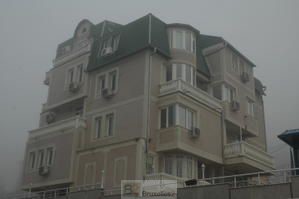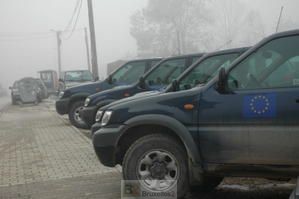Kosovo 5: The mission is only waiting for the green light from the Council to deploy
(B2 in Pristina) On the heights of Pristina, with the Europeans of EUPT, the preparation team for the ESDP mission

On the heights of Pristina, in the district of Gërmaia – which also houses the Kosovo civil protection force, made up in particular of former rebels of the Kosovo Liberation Army (UCK) – a building, a few stories high, emerges from the fog. No big flag, no decorum. But a discreet plate and an anonymous security guard. Yes, “it is here” that the preparation team for the future “rule of law” mission (police, justice, customs) of the EU (alias EUPT Kosovo) has established its headquarters. It is a bit far from the center, where Kosovo institutions (government, parliament, ministries...), international organizations (United Nations Interim Administration Mission in Kosovo UNMIK...) and Europeans (Commission, Council of the EU, Agency for Reconstruction), gathered in a protected area. But it's more discreet.
Recruitment in progress
« Welcome. You come for an interview, for which position »? The questions of some crossed officials fuse immediately. No need for long comments to understand the state of mind. If the ESDP mission has not officially started, the impatience is there. In the car park, about forty vehicles are parked, most with the European Union “sticker”. A hundred people (65 international experts and 45 locals) are already hard at work. Their mission is multiple.
Under the leadership of Roy Reeve - an English diplomat, specialist in the Soviet Union and the establishment of new States, and number 2 of the future mission -, it is first a question of ensuring the link with the other authorities (Serbs and Kosovars) and other institutions (EU, UN, NATO, OSCE...), as well as with active police forces (KPS, MINUK, KFOR, MSU, special services...). The operational intervention methods are planned. You also have to plan all the logistics.
Everything, in fact, must be in place – offices, vehicles, computers, radios, telephones, etc. – so that staff can work immediately as soon as they arrive. Which is not an easy task, given the difficulties in the environment: power cuts two or three times a day, difficult weather conditions (fog, snow, temperature varying between –20° and 10°) and hazardous traffic (small roads congested, often frozen where accidents are legion).
Last but not least, the mission of the Team is to complete the organizational charts (all are ready) to put a name on each position. A first selection was made in December, in order to establish " short list » for each function. It now remains to select the right people. A second selection began in early January in Brussels or Pristina. A little over 1000 people, from all the Member States (and third countries), will be chosen in this way.

Recruitment not always easy when Member States get involved!
Admittedly, the selection is carried out directly at European level, unlike military missions as such. But the States nevertheless keep an eye on certain " prestigious positions ". " We have more candidates to be a political adviser, for example, than to provide IT “, assures an expert of the Team. " While the actual importance of functions is sometimes reversed ».
The only exception, the members of the Special Police Unit (SPU), about 500 police officers responsible for maintaining order, will come directly from units already formed in the States. Three countries—France (gendarmes), Italy (carabinieri), Poland—will provide the backbone of this force. And possibly Romania. The participation of this country remains in suspense, for reasons both political (the country's position on independence) and efficiency (training “not at the top”, cautiously suggests a specialist). As for the heads of units, they are almost all selected and will arrive when the diplomatic green light is given, like the director of the mission, the former French general, Yves de Kermabon.
Diplomatic planning
In Brussels, the draft CONOPS (concept of operation) and Common Action (the political decision) have begun to be distributed to the delegations of the 15. A first examination took place at the Political and Security Committee (COPS), on 18 (for the CONOPS) and 28 January (for the Joint Action). The objective is that they can be approved, as soon as possible, by the Ministers of Foreign Affairs. If the date of January 18 is ruled out, because of the Serbian election, as confirmed by the Slovenian authorities, the decision should be taken at the Council meeting on February XNUMX. " A bit late date though “, say some diplomats.
« If necessary “, an early adoption could take place without debate at another Council, or rather in an extraordinary meeting of the Council. An ESDP mission is normally launched by Foreign Ministers. The operation plan (OpPlan) and the decision to officially launch the operation will be approved immediately (note that the general concept of operation was already approved in December 2006).
On the basis of the "green light" from the ministers, the ESDP mission should be deployed during a transition period which should be spread over three or four months, in successive waves, gradually taking over from the forces of the UNMIK Police, Justice and Customs. The rise in power would take place slowly at first (a few dozen men in the first month) and would then accelerate (the main arrivals being planned for the last month). This transition period may be shortened, if necessary.
In fact, some personnel or units of the future ESDP mission are already hard at work in Kosovo: at UNMIK or KFOR, within the military forces proper or the MSU, or are on alert in the Member States . At the end of this process, the 1 men and women who make it up will be distributed throughout Kosovo: within the Kosovo police (825 headquarters and 6 local police stations), jurisdictions (34 regional courts), at the borders (particularly with Serbia, “Gate5” and “Gate1”), and at certain strategic locations (Pristina airport, prison, etc.); the Special Police Unit being based in Pristina.
The ideal scenario: between February and June-July
For some people in charge of EU security missions, the "ideal" scenario in Kosovo would be that " the authorities of Kosovo make only a 'declaration of intent' of independence, in February, coupled with an 'official invitation' to the EU to send its mission ". The formal proclamation of independence being done at a later date, ideally in June-July ". A useful period of time to put in place all the instruments of the new state (Constitution, legislative framework, flag, anthem, etc.) - a task to which, with remarkable discretion, a small team is busy, bringing together senior Kosovar officials and experts from the OSCE — and to allow the setting up of all the European bodies.
The civilian ESDP mission is, in fact, only one element of the various actions that the European Union will implement in the future independent state. Will be present: the International Civil Office (ICO) which will, around the EU special representative, ensure the political representation of the EU, and certain other civilian assistance missions of the Kosovar government, and a delegation , reinforced, of the European Commission which will concentrate on the economic development, the structural reforms and the regional integration of Kosovo.
An ideal scenario which also corresponds to historical and... climatic data. It was between February 20 and 28, 1988 that the generalized strike movement broke out, particularly in the Trepca mines. And it was on March 17, 2004 that the riots broke out in Mitrovica (19 dead)... As a NATO soldier pointed out: “ here, everything starts with the thaw, at the end of February or the beginning of March! ».
(Nicolas Gros-Verheyde)



Comments closed.